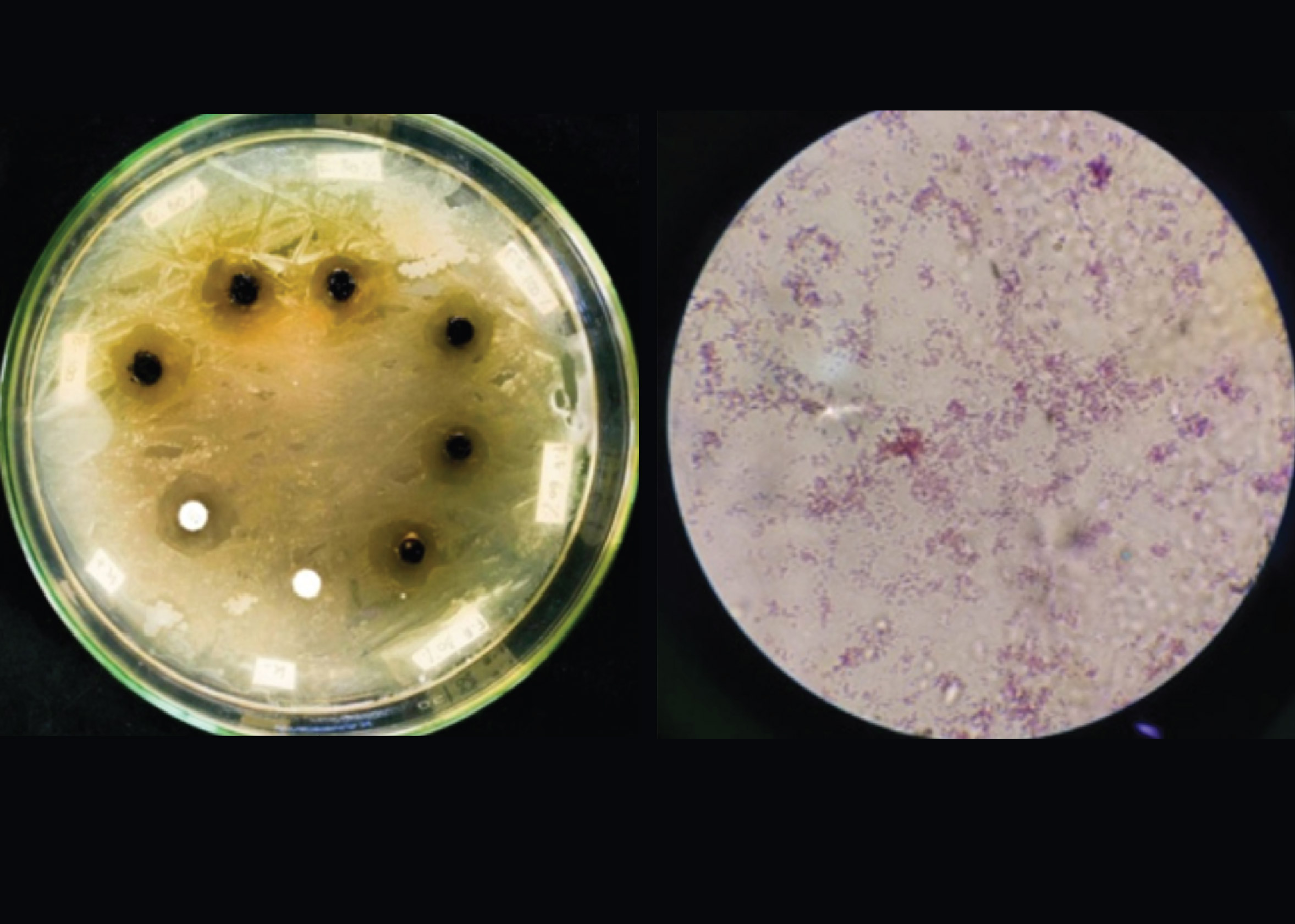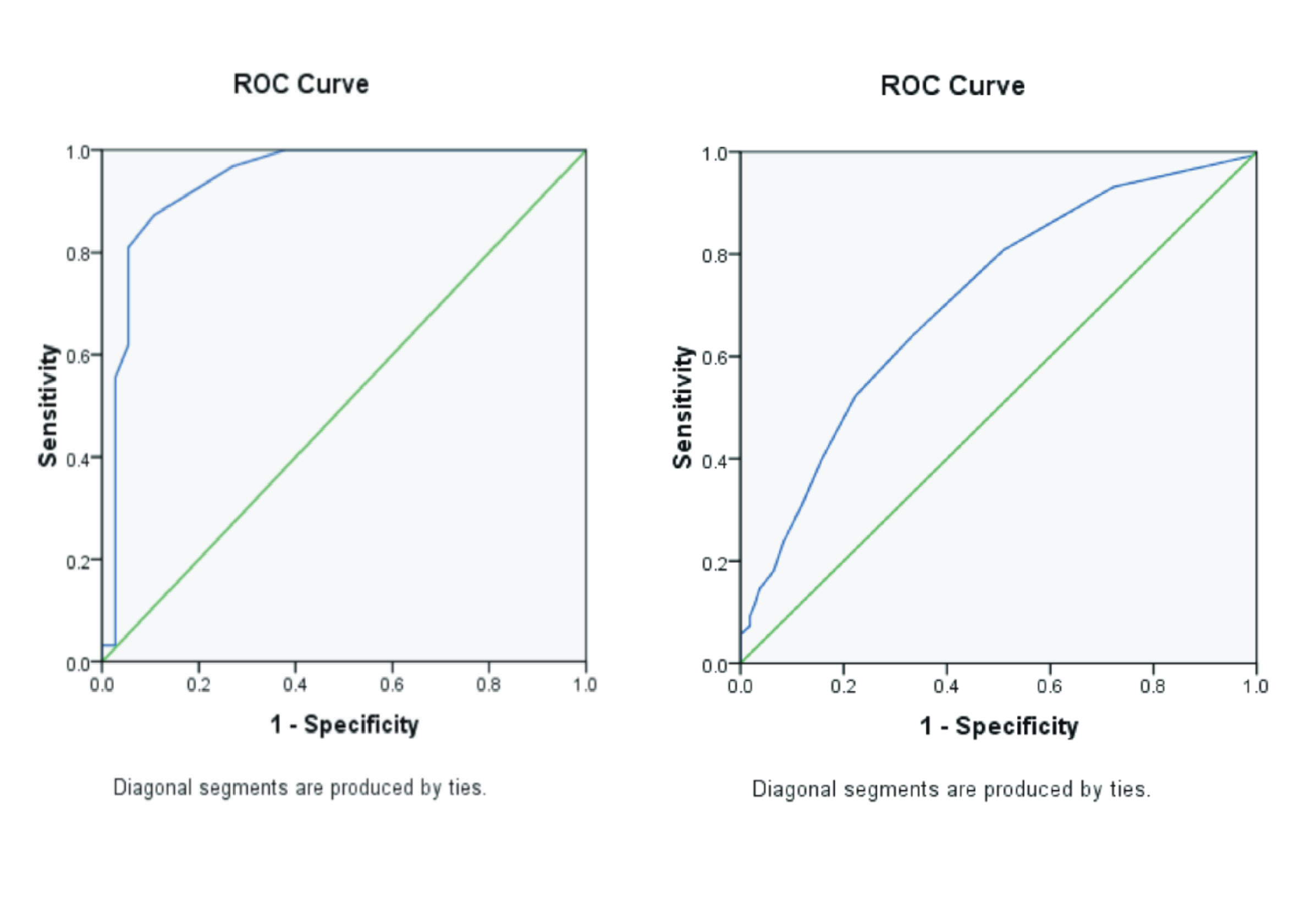ANTI-BACTERIAL ACTIVITY TEST OF ETHANOL EXTRACTS AND ETHLACETATE FRACTION FROM THE EXTRACT OF JATROPHA CURCAS L. LEAVES AGAINST STAPHYLOCOCCUS AUREUS

Downloads
Background: Staphylococcus aureus is a gram-positive bacteria that can cause infection. One of the plants that has antibacterial activity is jatropha leaves which contain flavonoids, saponins, tannins, alkaloids, steroids and polyphenols. Purpose: To determine the antibacterial activity of ethanol extract and ethyl acetate fraction with concentrations of 30%, 60% and 100% against Staphylococcus aureus bacteria. Method: The method for extracting jatropha leaves is maceration with 96% ethanol solvent and the fractionation method, namely liquid-liquid fractionation with ethyl acetate solvent. Antibacterial activity test was carried out in vitro with the disc diffusion method and compared the mean zone of inhibition of each treatment with a positive control (gentamicin 10 μg). Result: The results showed that the ethanol extract and ethyl acetate fraction of jatropha leaves had a strong resistance response, while the positive control gave a very strong inhibitory response to the growth of S. aureus bacteria. Based on the one way ANOVA test, ethanol extract and ethyl acetate fraction showed a significant difference from each treatment with a significant value (P=<0.05). Conclusion: The ethanol extract of Jatropha leaves can inhibit the growth of S. aureus bacteria at a concentration of 100% (18.28 ± 0.50 mm), 100% concentration of ethyl acetate fraction (15.10 ± 0.12 mm). The ethanol extract provided the best inhibition power, namely 18.28 ± 0.50 mm and a positive control 21.82 ± 0.092 mm.
Anyanwu, O.O., Eze, P.M., I.E., N., Ngwoke, K.G., 2018. Antimicrobial Properties of Jatropha curcas L. against Dental Pathogens. Glob. J. Med. Res. 18, 12–15.
Bawotong, R.A., Queljoe, E. de, Mpila, D.A., 2020. Salep Ekstrak Daun Jarak Pagar (Jatropha curcas L.) terhadap Penyembuhan Luka Sayat Pada Tikus Putih Jantan Galur Wistar (Rattus Norvegicus). Pharmacon J. Ilm. Farm. 9, 284–293.
Dewi, A.K., 2013. Isolasi, Identifikasi dan Uji Sensitivitas Staphylococcus auerus terhadap Amoxicillin dari Sampel Susu Kambing Peranakan Ettawa (PE) Penderita Mastitis di Wilayah Girimulyo, Kulonprogo, Yogyakarta. J. Sain Vet. 31, 138–150.
Fadhlya, E., Kusrinia, D., Fachriyah, E., 2015. Isolasi Identifikasi Senyawa Alkaloid dari Daun Rivina Humilis L. serta Uji Sitotoksik menggunakan Metode BLST (Brine Shrimp Lethality Test). J. Kim. Sains dan Apl. (Journal Sci. Appl. Chem. ) 18, 67–72.
Frelinsia, D., S. Wewengkang, D., Antasionasti, I., 2020. Uji Aktivitas Antioksidan Ekstrak Etanol Ascidian Herdmania Momus dengan Metode DPPH (1,1-difenil-2-pikrilhidrazil). Pharmacon 9, 1–6.
Guranda, I., Maulanza, H., 2016. Uji Effektifitas Tanaman Jarak Pagar (Jatropha curcas L.) sebagai Anti Mikroorganisme pada Bakteri Escherichia Coli. J. Sains dan Apl. ( Serambi Saintia) 4, 42–49.
Hajiriah, T.L., Intan, P.K., 2019. Uji Efektifitas Getah Jarak Pagar (Jatropha Curcas) Sebagai Obat Pengganti Antiseptik Kimia. J. Kependidikan J. Has. Penelit. dan Kaji. Kepustakaan di Bid. Pendidikan, Pengajaran dan Pembelajaran 5, 141–148.
Handayani, H., Sriherfyna, F.H., Yunianta, Y., 2016. Ekstraksi Antioksidan Daun Sirsak Metode Ultrasonic Bath (Kajian Rasio Bahan : Pelarut Dan Lama Ekstraksi) [In Press Januari 2016]. J. Pangan dan Agroindustri 4.
Hayati, L.N., Tyasningsih, W., Praja, R.N., Chusniati, S., Yunita, M.N., Wibawati, P.A., 2019. Isolasi dan Identifikasi Staphylococcus aureus pada Susu Kambing Peranakan Etawah Penderita Mastitis Subklinis di Kelurahan Kalipuro, Banyuwangi. J. Med. Vet. 2, 76–82.
Indriyanti, E., Purwaningsih, Y., Wigati, D., 2018. Skrining Fitokimia dan Standarisasi Ekstrak Kulit Buah Labu Kuning (Cucurbita moschata). J. Ilm. Cendekia Eksakta 3, 20–25.
Julianti, R., Harlis, H., Harizon, H., 2017. Pengaruh Ekstrak Daun Manggis (Garcinia mangostana Linn.) terhadap Pertumbuhan Bakteri Escherichia coli Sebagai Pengayaan Bahan Ajar Praktikum Mikrobiologi. Jambi. Universitas Jambi.
Kurniawati, E., 2015. Daya Anti Bakteri Ekstrak Etanol Tunas Bambu Apus terhadap Bakteri Escherichia coli dan Staphylococcus aureus secara In Vitro. J. Wiyata Penelit. Sains dan Kesehat. 2, 193–199.
Mulangsri, D.A.K., Zulfa, E., Arifin, S., Faqih, M., 2019. Standarisasi Ekstrak Terpurifikasi Daun Mangga Arumanis (Mangifera indica L.). Inov. Tek. Kim. 4, 40–43.
Muntiaha, M.C., Yamlean, P.V.Y., Lolo Astuti, W., 2014. Uji Efektivitas Sediaan Krim Getah Jarak Cina (Jatropha multifida L.) Untuk Pengobatan Luka Sayat YangTerinfeksi Bakteri Staphylococcus aureus Pada Kelinci (Orytolagus cuniculus). Pharmacon J. Ilm. Farm. 3, 294–302.
Ningsih, D.R., Zusfahair, Z., Mantar, D., 2017. Ekstrak Daun Mangga (Mangifera Indica L.) sebagai Antijamur terhadap Jamur Candida Albicans dan Identifikasi Golongan Senyawanya. J. Kim. Ris. 2, 61–68.
Nurhasnawati, H., Sukarmi, S., Handayani, F., 2017. Perbandingan Metode Ekstraksi Maserasi dan Sokletasi terhadap Aktivitas Antioksidan Ekstrak Etanol Daun Jambu Bol (Syzygium Malaccense L.). J. Ilm. Manuntung Sains Farm. dan Kesehat. 3, 91–95.
Nuria, M.C., Faizatun, A., Sumantri, 2009. Uji Aktivitas Antibakteri Ekstrak Etanol Daun Jarak Pagar (Jatropha curcas L.) terhadap Bakteri Staphylococcus aureus, Escherechia coli dan Salmonela typhi ATCC 1408. MEDIAGRO (Jurnal Ilmu - Ilmu Pertanian) 5, 26–37.
Oktaviani, D.J., Widiyastut, S., Maharani, D.A., Amalia, A.N., Ishak, A.M., Zuhrotun, A., 2019. Review: BahanAlami Penyembuh Luka. Maj. Farmasetika 4.
Paju, N., V.Y., P., Yamlean, N.K., 2013. Uji Efektivitas Salep Ekstrak Daun Binahong (Anredera Cordifolia( Ten Steenis) Pada Kelinci yang Terinfeksi Bakteri Staphylococcus aureus. Pharmacon J. Ilm. Farm. 2.
RISKEDAS, B.P. dan P.K.K.K., 2013. Riset Kesehatan Dasar Provinsi Jawa Timur.
Rostini, W., Mardiana, U., Mardianingrum, R., 2018. Uji Aktivitas Ekstrak Etanol Kombinasi Daun Leunca (Solanum Nigrum L.) Dan Daun Jarak Pagar (Jatropha Curcas L.) Terhadap Bakteri Staphylococus Aureus. Pharmacoscript 1.
Septyaningsih, D., 2010. Isolasi dan Identifikasi Komponen Ekstrak Biji Buah. Universitas Sebelas Maret.
Setyaningsih, D., Pandji, C., Perwatasari, D.D., 2014. Antimicrobial Screening and Stability Studies of The C Extract of Jatropha curcass Linn. Latex (Euphorbiaceae). AGRITECH 34, 126–137.
Tanaya, V., Retnowati, R., Suratmo, S., 2015. Fraksi Semi Polar dari Daun Mangga terhadap Amoxicillin dari Sampel Susu Kambing Peranakan Ettawa (PE). J. Ilmu Kim. Univ. 1, 778–78418.
Warsinah, Baroroh, H.N., Harwoko, H., 2017. Anti-Inflammatory Effect of The Fractions of Ethanol Extract of Jatropa Curcas L Leaves. Int. J. Pharmacogn. Phytochem. Res. 9, 351–354.
WHO, 2016. Injury Acute and Chronic [WWW Document]. URL https://ners.unair.ac.id/site/index.php/news-fkp-unair/308 (accessed 4.17.21).
Yajid, A.I., Ab Rahman, H.S., Wong, M.P.K., Zain, W.Z.W., 2018. Potential Benefits Of Annona Muricata In Combating Cancer: A Review. Malaysian J. Med. Sci. 25, 5–15.
Yuliani, N.N., Sambara, J., Mau, M.A., 2016. Uji Aktivitas Antioksidan Fraksi Etil Asetat Ekstrak Etanol Rimpang Jahe Merah (Zingiber officinale var. Rubrum) dengan Metode DPPH (1,1-Dyphenyl-2-Picrylhydrazyl). J. Info Kesehat. 14, 1091–1111.
Yusriana, C.S., Budi, C.S., Dewi, T., 2014. Uji Daya Hambat Infusa Daun Nangka (Artocarpus heterophyllus) Terhadap Pertumbuhan Bakteri Staphylococcus aureus. J. Permata Indones. 5, 1–7.
Copyright (c) 2021 Journal of Vocational Health Studies

This work is licensed under a Creative Commons Attribution-NonCommercial-ShareAlike 4.0 International License.
- The authors agree to transfer the transfer copyright of the article to the Journal of Vocational Health Studies (JVHS) effective if and when the paper is accepted for publication.
- Legal formal aspect of journal publication accessibility refers to Creative Commons Attribution-NonCommercial-ShareAlike (CC BY-NC-SA), implies that publication can be used for non-commercial purposes in its original form.
- Every publications (printed/electronic) are open access for educational purposes, research, and library. Other that the aims mentioned above, editorial board is not responsible for copyright violation.
Journal of Vocational Health Studies is licensed under a Creative Commons Attribution-NonCommercial-ShareAlike 4.0 International License














































